A new bill has been proposed seeking to centralise gambling regulation across Nigeria and is now facing mounting opposition from state governments and the Federation of State Gaming Regulators of Nigeria (FSGRN). The Central Gambling Bill has already passed its Third Reading in the National Assembly, with the aim to unify control of all gambling activities under a federal regulatory body.
The bill proposes the establishment of a National Gaming Commission with authority to oversee gambling operations across the country. However, critics argue that the bill directly contradicts a November 2024 Supreme Court ruling that affirmed state governments’ exclusive right to regulate gambling within their respective jurisdictions.
Supreme Court Ruling at the Center of Dispute
At the heart of the opposition is the contention that the Central Gambling Bill violates Nigeria’s 1999 constitution and recent judicial precedent. The Supreme Court decision cited by the FSGRN upheld the autonomy of state governments in regulating gambling activities within their borders.
The FSGRN argues that this move undermines legal clarity and disregards constitutional boundaries. According to the federation, allowing a federal body to override state regulations would dismantle a system that has provided local governments with oversight and control over a significant revenue-generating sector.
National Assembly Pushes Ahead Despite Protests
Although the FSGRN and various state governments have voiced strong objections, the National Assembly continues to advance the bill. Lawmakers supporting the legislation assert that a unified framework is essential for maintaining national standards, curbing unregulated gambling operations, and attracting foreign investment into the gaming industry.
Proponents also claim that a centralised structure will improve tax collection, ensure better consumer protection, and reduce inconsistencies in enforcement across different states.
Observers say the push for central regulation may also be linked to the growing size and profitability of Nigeria’s gambling market, which has expanded rapidly in recent years.
Gambling Regulation Faces Changes Across Africa
Nigeria’s regulatory debate has come during broader shifts in gambling policy across the African continent. In Kenya, the Betting Control and Licensing Board recently enacted new advertising restrictions aimed at curbing the influence of gambling promotions. As of May this year, gambling advertisements were banned nationwide for a period of 30 days
Following the temporary suspension, the regulator issued a directive permanently prohibiting celebrities and influencers from appearing in gambling-related promotions. The move reflects growing concerns over the social impact of gambling and its influence on young audiences.
As African markets continue to grow, nations are taking varying approaches to regulation. Nigeria now faces a constitutional showdown over control of its growing gambling sector. The outcome of the Central Gambling Bill could set a legal and regulatory precedent for the rest of the region.

 Companies
Companies 





